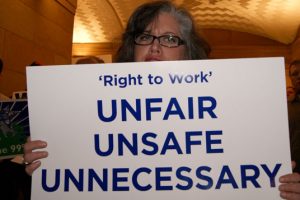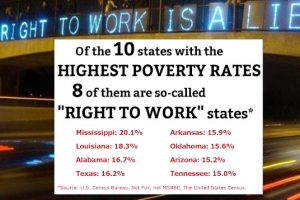
A Small Case with Big Ramifications
This case, brought by the National Right to Work Committee, which has been linked to billionaire conservative mega-donors Charles and David Koch, could render a ruling that would impact all public sector unions, even in Ohio, in a manner similar to “Right to Work” legislation.

Right to Work: Overworked and Underpaid
There is a fair amount of discussion regarding the “Right to Work” initiative that is being debated in many states. In short, I have experienced this “right” firsthand. Before I taught science in Columbus City Schools, I was employed at a private, non-parochial school in Columbus, Ohio. There was no union.

Right to Work: Don’t Trust It!
Whether it’s the “Workplace Freedom” initiative or so-called “Right to Work,” DON’T trust it! The words “freedom” or “right” may sound really positive, but they have completely different meanings for extremist legislators than they do for Ohio’s working families. Words have power. Important decisions are made on a daily basis, simply because of the choice of words, so people need to be careful not to be misled. Let’s look at this issue and see what it really means.

Protecting Ohio Workers’ Rights
For the past couple of months, I’ve had the opportunity to travel around Northwest Ohio, presenting information to groups about so-called right to work at Urgent Member Meetings — Protecting Ohio Workers’ Rights (POWR) — along with my friend Kate Jacob from the AFL-CIO. When I talk to teachers at these meetings, I try to draw on the parallel between plagiarism and so-called right to work laws. We wouldn’t tolerate a situation where a student gets an A by copying another student’s paper, having done none of the work to earn that grade. Why would we tolerate a situation where most workers contribute to the union so they can negotiate a fair contract, while a few pay nothing and get the exact same benefits that the union bargained for?

Stories from the Front: Working in a RTW State
Knowing how often things get sensationalized, I work hard to find reliable sources for information. With a RTW group petitioning to put a Constitutional Amendment on the November ballot, I need to find information I can trust, so I can form an educated opinion. What I’ve found is that the most reliable and meaningful information has come, not from newspaper articles or television shows, but from other educators. Listening to their stories about what it’s like to teacher in states with RTW laws has given me the insights I need to understand why these are harmful and what I can expect if they are enacted in Ohio.
